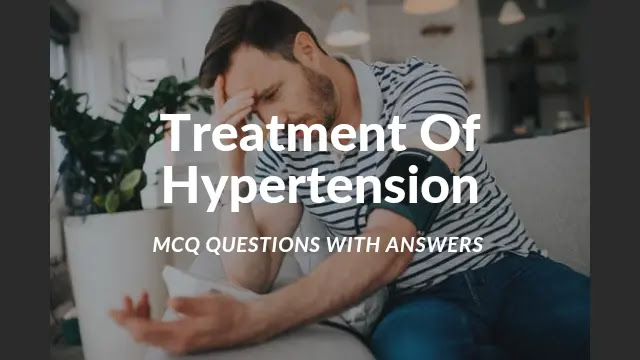Multiple-choice questions and answers related to the Treatment of Hypertension
Question 1:
Which of the following lifestyle changes is NOT recommended as a first-line treatment for hypertension?
A) Regular exercise
B) Smoking cessation
C) Adopting a healthy diet (e.g., DASH diet)
D) Reducing alcohol consumption
E) None of the above
Answer: E) None of the above
Question 2:
Which class of medications is often considered the first-line treatment for hypertension?
A) Beta-blockers
B) Diuretics
C) Angiotensin-converting enzyme (ACE) inhibitors
D) Calcium channel blockers
E) Alpha-blockers
Answer: B) Diuretics
Question 3:
Which of the following medication combinations is commonly used for hypertensive patients who do not respond to single-drug therapy?
A) Beta-blocker + Diuretic
B) ACE inhibitor + Alpha-blocker
C) Calcium channel blocker + Beta-blocker
D) ACE inhibitor + Diuretic
E) Calcium channel blocker + Alpha-blocker
Answer: D) ACE inhibitor + Diuretic
Question 4:
In hypertensive emergencies (severe hypertension with acute end-organ damage), which intravenous medication is commonly used for rapid blood pressure reduction?
A) Amlodipine
B) Metoprolol
C) Hydrochlorothiazide
D) Nitroglycerin
E) Nitroprusside
Answer: E) Nitroprusside
Question 5:
Which dietary modification is known to have a positive impact on blood pressure control?
A) Decreasing potassium intake
B) Increasing sodium intake
C) Consuming more processed foods
D) Reducing dietary fat intake
E) Increasing caffeine consumption
Answer: D) Reducing dietary fat intake
Question 6:
Which of the following lifestyle modifications has been shown to lower blood pressure in hypertensive patients?
A) Increased stress levels
B) Sedentary lifestyle
C) Weight loss
D) High sodium diet
E) Irregular sleep patterns
Answer: C) Weight loss
Question 7:
In patients with hypertension and diabetes, which class of medications is particularly beneficial due to its protective effects on the kidneys?
A) Beta-blockers
B) Diuretics
C) Angiotensin-converting enzyme (ACE) inhibitors
D) Calcium channel blockers
E) Alpha-blockers
Answer: C) Angiotensin-converting enzyme (ACE) inhibitors
Question 8:
Which medication is commonly prescribed to pregnant women with hypertension to prevent complications?
A) Ibuprofen
B) Aspirin
C) Angiotensin receptor blockers (ARBs)
D) Methyldopa
E) Statins
Answer: D) Methyldopa
Question 9:
Which of the following is NOT a potential side effect of calcium channel blockers used for hypertension?
A) Headache
B) Peripheral edema
C) Constipation
D) Dry cough
E) Dizziness
Answer: D) Dry cough
Question 10:
For hypertensive patients who also suffer from angina (chest pain due to reduced blood flow to the heart), which class of medications is commonly prescribed?
A) Beta-blockers
B) Diuretics
C) Alpha-blockers
D) Angiotensin-converting enzyme (ACE) inhibitors
E) Calcium channel blockers
Answer: A) Beta-blockers
Question 11:
Which antihypertensive medication class is contraindicated in pregnant women due to the risk of fetal harm?
A) Beta-blockers
B) Diuretics
C) Angiotensin-converting enzyme (ACE) inhibitors
D) Calcium channel blockers
E) Alpha-blockers
Answer: C) Angiotensin-converting enzyme (ACE) inhibitors
Question 12:
In resistant hypertension (when blood pressure remains high despite treatment with three or more medications), which procedure may be considered to interrupt renal sympathetic nerves and lower blood pressure?
A) Angioplasty
B) Coronary artery bypass grafting
C) Carotid endarterectomy
D) Renal denervation
E) Pacemaker insertion
Answer: D) Renal denervation
Question 13:
Which of the following lifestyle changes is particularly effective in reducing blood pressure in hypertensive patients?
A) Reducing stress through meditation and relaxation techniques
B) Increasing caffeine intake
C) Skipping meals to reduce caloric intake
D) Decreasing physical activity to avoid exertion
E) Increasing alcohol consumption in moderation
Answer: A) Reducing stress through meditation and relaxation techniques
Question 14:
For hypertensive patients with heart failure, which class of medications is commonly used to improve cardiac function and reduce symptoms?
A) Beta-blockers
B) Diuretics
C) Alpha-blockers
D) Angiotensin receptor blockers (ARBs)
E) Calcium channel blockers
Answer: D) Angiotensin receptor blockers (ARBs)
Question 15:
Which lifestyle change is crucial for managing hypertension in older adults?
A) Avoiding all types of physical exercise
B) Adopting a low-protein diet
C) Staying socially isolated to reduce stress
D) Regular monitoring of blood pressure
E) Increasing sugar intake to maintain energy levels
Answer: D) Regular monitoring of blood pressure

Comments
Post a Comment